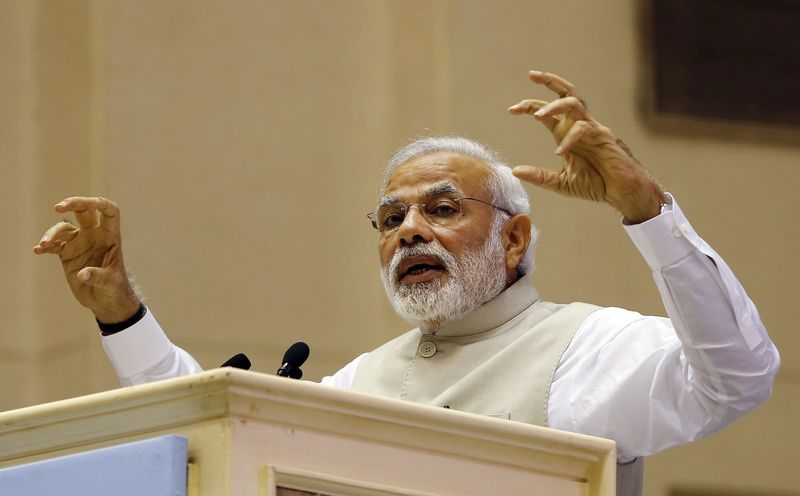(Bloomberg Opinion) -- At the time of his first bid to become India’s prime minister five years ago, Narendra Modi was seen by many in Mumbai as a reformer rising to slay crony capitalism, corruption and policy paralysis. It was the bureaucracy in New Delhi that had misgivings about the then chief minister of Gujarat state, known for his highly centralized style of working.
By now, the political capital has accepted Modi as the boss man. By contrast, the financial capital of Mumbai is anxious about further centralization of power. He’s already being referred to as India’s Xi Jinping. Given the difficulties that have beset China’s private sector under the president’s muscular leadership, that comparison isn’t exactly flattering.
Mumbai’s trepidation, based on my recent conversations, arises from not knowing whether Modi will double down on his strongman image and chest-thumping nationalism in his second term, or give India’s institutions the freedom to tackle the economy’s central challenge: a lack of risk capital. In 2014, it was only the balance sheets of the banking system and some large business groups that were toast. Now the problem has spread to smaller companies, shadow banks, and property developers. Even consumers are being singed by debt as income growth in rural areas slows. Private investment turned anemic long ago.
Addressing this challenge will require Modi to acknowledge a simple truth: Countering economic worries with propaganda, jingoism and dubious GDP statistics will have diminishing returns. India’s “mini-Lehman moment,” as I’ve called it since September, is still reverberating. The solution is simple. Let entrenched business families fend for themselves. Don’t give them new contracts or sweetheart deals, or let them hold on to bankrupt firms. That should be done not out of moral compunction but because local businessmen or financiers can’t save the economy. Only North American, European, Australian and East Asian money can.
After Modi’s 2014 election victory, he did make an overture to foreign investors. But his finance minister, Arun Jaitley, didn’t keep the promise of making India’s tax regime more predictable and less adversarial. In the name of protecting mom-and-pop retailers and the sovereignty of Indian consumers’ data, the e-commerce policy now appears to favor tycoon Mukesh Ambani over Amazon (NASDAQ:AMZN).comInc.’s Jeff Bezos. Protectionism has gone up. The Donald Trump administration is far from amused.
It’s not too late. Unlike in 2014, institutional structures now exist for large-scale asset monetization. Infrastructure Investment Trusts took years to become reality, but can now be used to pass cash-generating assets to foreign buyers such as Canada’s Brookfield Asset Management Inc., relieving pressure on stretched government finances and stressed private-sector balance sheets.
Australia’s Macquarie Group Ltd. paid 97 billion rupees ($1.4 billion) last year to acquire a bunch of highways under a toll-operate-transfer model – another new structure in India. Singaporean sovereign wealth fund GIC Pte, recently given S$45 billion ($33 billion) by its central bank to earn more for the aging city-state, has announced an investment platform to hunt for hospitality assets together with the Tata Group, which owns the Taj hotel chain.
A lot of good work from Modi’s first term has been hijacked by vested interests. A 2016 bankruptcy law put off overseas participants by throwing out a successful Bain Capital-backed bid for a cement maker, and by giving the runaround to ArcelorMittal’s $6 billion acquisition of Essar Steel India Ltd. It can still be salvaged to reduce the $200 billion-plus bad loan burden of banks. Meanwhile, only an empowered and autonomous Reserve Bank of India can deal with troubled shadow lenders and restore trust in wholesale funding markets. Modi should nurture the credibility of the new National Investment and Infrastructure Fund, which can attract billions of dollars as long as the 51% private-owned fund isn’t used to bail out dud assets like the grounded Jet Airways India Ltd.
Strongmen find it hard to tolerate dissent and independent-minded central bankers – Modi lost two of them. They surround themselves with bad advisers. A disastrous ban on 86% of the country’s cash, halfway through Modi’s first term, marked a wrong turn in economic policy-making. To demonstrate a renewed commitment to truth and trust with the rest of the world, the new administration must rebuild the credibility of India’s official statistics. Market participants in Mumbai yearned for a leader who could deliver Chinese-style rapid growth. Questionable claims of 7% GDP expansion weren’t what they had in mind.
This isn’t the time for economic nationalism. Xi’s Made in China 2025 roadmap for global technological domination raised U.S. ire. Modi’s opportunity lies in filling the gap created by a spent domestic business class with eager global investors looking for returns as well as a refuge from the U.S.-China conflict. To grab this chance, Modi needs to rein in his strongman instincts, embrace the world, and allow India’s economic institutions space to breathe.
